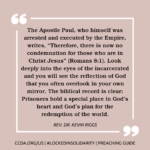The CCDA Institute in Augusta, GA
Who has the privilege of defining a neighborhood, of naming its assets and its needs?
The city of Augusta, Georgia, is eyeing its Harrisburg neighborhood as a potential site for development because of its prime location. The press has defined Harrisburg as a dangerous place that is best to avoid. The operators of a day shelter for people with mental illness in Harrisburg envision a community that welcomes and cares for troubled people. A neighborhood association envisions Harrisburg as a place free of the day shelter’s clientele.
Marsha Jones, music director and director of outreach at St. Luke’s United Methodist Church in Harrisburg, saw a neighborhood on the precipice: the community’s many assets make it a prime target for gentrification, and she hoped for a way to capture those assets “and at the same time make sure there is still low-income housing for people who have lived there for generations.” The city’s growing interest in Harrisburg’s development potential made it “a really good time to get into the community and say, ‘What do the people who live here want?’”
Jones saw that although everyone agrees that they want the neighborhood to be a safe place for kids to play, there has been intense conflict between neighbors about how to reduce crime. “People who have lived here for years and own homes are afraid, and people coming to the day shelter are afraid,” she said. “Because they’re afraid, they can’t get past the first step and say, ‘Who is this person, really?’ We’ve got to have a conversation together.”
That long-needed conversation began at a CCDA [Intensive] that Jones and St. Luke’s brought to Augusta on May 7–8, 2010. Jones invited community leaders, staff from local nonprofits, and people from outside the region to participate in two classes over two days: Listening to the Community, facilitated by CCDA board member Delia Caderno of Partners for Community Transformation in Miami, and Empowerment, taught by Bob Lupton, founder and president of FCS Urban Ministries in Atlanta. Jones’s invitations brought out people representing a broad cross-section of community residents, including members of opposing factions in an intense neighborhood dispute.
Before teaching her class, Delia toured the community and learned about some of its assets and its challenges. Then she customized her class for the audience. Instead of just providing a forum for listening to the community and teaching about asset-based community development, she also facilitated the creation of an asset map of the neighborhood.
Delia’s full agenda meant that everyone had to move very quickly, CCDA digital communications coordinator Chris Like recalled, but a day that began with complaints about the pace “ended with plans and a vision and a greater understanding of what it would take to get their neighborhood active and involved.” Bob Lupton’s Empowerment session on the second day drew a larger crowd that included more people from outside Harrisburg.
During Delia’s asset-mapping exercise, groups of attendees gathered to write down their own skills and resources, then record the physical assets of the community: sidewalks, trees and greenery, a beautiful canal along the border, sturdy houses, people who have yards and like to be out and about in public spaces. Then the groups listed people assets: organizations, churches, civic functions, and so on. Finally the groups brainstormed about what more they could do to engage the community and listen to it; this process produced ideas for next steps.
Discussing the community’s assets was transformative for many participants. Augusta resident and St. Luke’s volunteer Gloria Norwood reported learning that “you can live in Harrisburg without a car—rare in Augusta and in the South. You can walk to what you need, and there’s a bus station. For a lower-income neighborhood to be able to walk is a big positive. I didn’t realize that before.”
The exercise also increased personal engagement among neighbors. “It’s so easy to have bad feelings about people,” Norwood said, “but when you get to know them you don’t have those feelings.” The [Intensive] created a way to match people who have particular needs with people who have corresponding assets. It helped neighbors find each other—by gathering people for a community garden, for example. “Ms. Jones didn’t know Ms. Smith,” Norwood explained, “but they both like to grow tomatoes.”
The increased neighborhood engagement didn’t end with the [Intensive]. A few weeks after the learning weekend, about 20 people gathered to make an interim plan for going forward. They decided to conduct a neighborhood survey, and a few participants volunteered to begin drawing up a list of questions. There has also been talk of starting a community development corporation in the neighborhood. “We can all agree that it’s time to go into the neighborhood and try and connect the dots,” Jones said.
Harrisburg native Michael Strickland traveled from his home in Atlanta to attend the [Intensive]. He was impressed that “the presenters tried to bring a sense of ethics and compassion back to the community. . . . CCDA has helped us by giving us the tools we need to create a positive dialogue among ourselves as a community.”
Strickland urges people outside Augusta to host CCDA [Intensives] in their own towns and cities: “This is a very caring, compassionate, and well-informed group of individuals who can provide a community with the necessary tools they will need to begin transforming their community in a humane and compassionate way.”
To learn more about hosting a CCDA Institute class [Intensive] in your community, contact Dave Clark at dave@ccda.org.




